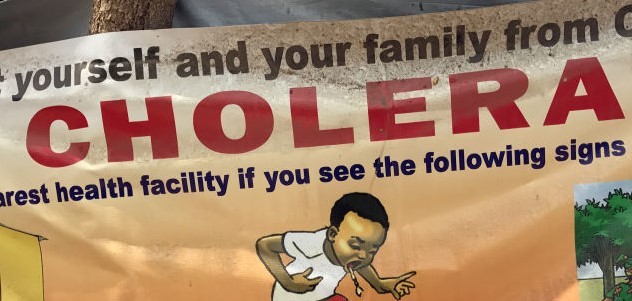The Ministry of Health in Juba has said South Sudan is susceptible to a renewed cholera outbreak as the disease has resurged in neighbouring Ethiopia.
The Director-General for Preventive Health Services at the National Ministry of Health, Dr. John Rumunu, speaking during a press conference in Juba on Sunday, said areas such Akobo County in Jonglei, Pochalla in Pibor, and Kapoeta East County in Eastern Equatoria which border Ethiopia are at high risk.
According to Dr. Rumunu, the cholera outbreak in Ethiopia poses threats to the well-being of citizens of South Sudan and placed the three counties on high alert.
“On 15th December this year, South Sudan received a communication from WHO, Geneva cholera team indicating that cholera has been confirmed in South Bench Woreda, Bench Maji Zone, also known the Southern Nations, Nationalities and People's Region which is on the South Sudan border,” Dr. Rumunu said.
“The confirmed outbreak in Ethiopia poses a high risk to South Sudan and is a sobering or a more serious reminder of the need to take urgent steps to further protect people in South Sudan if the disease crosses into the country,” He added.
“On the South Sudan side of the international border, the following counties share borders with the affected locations in the Southern Nations, Nationalities and People's Region and Gambella region of Ethiopia. They are Akobo County in Jonglei state, Pochalla in Boma in greater Pibor administrative area, and Kapoeta East in Eastern Equatoria state.”
He said that the South Sudan emergency preparedness and response technical working group convened a meeting to coordinate and plan immediate preparedness activities involving the respective ministries of health, county health departments as well as health and water and sanitation partners.
Since December 2017, prevention and preparedness activities have been implemented to establish protective immunity against cholera through vaccination and addressing water, sanitation hygiene gaps in cholera hotspots in South Sudan. However, funds to roll out to all cholera hotspots are still lacking.
“Drink and use water that has been made safe after treating with chlorine or boiling. Always wash your hands with soap and water after using the latrine and before handling and eating food. Use latrines or bury your faeces and do not defecate in any water body. Cook food well, keep it covered and eat it hot always. Wash fruits and vegetables thoroughly with clean water before eating them. Keep a clean environment at home,” Dr. Rumunu advised.
South Sudan is currently battling the coronavirus pandemic, effects of flooding, and polio.
The country is also prone to diseases like meningitis, measles, yellow fever, and whooping cough are endemic in many areas.
Last week, the World Health Organization announced that more than 63,000 people had been given oral cholera vaccine in some parts of Jonglei state.
The vaccination campaign took place in Bor South County from 16th to 20th December 2020.
Cholera is a waterborne disease transmitted by eating food or drinking water that is contaminated with Vibrio cholera, the bacteria that causes the disease.
Cholera patients present with watery diarrhoea, vomiting, dehydration, abdominal pains, and muscle cramps.




